
Tell us what you need to find a matching loft conversion specialist

Get free quotes from professionals near you

Compare offers and choose the one that best matches your need
- Householdquotes.co.uk
- Driveway
- Driveway Materials
- Driveway Paving Stones
Driveway Paving Stones: Your Complete Guide

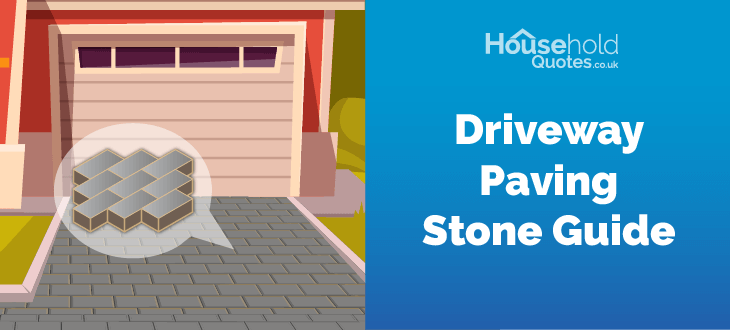
- Driveway paving stones, or pavers, are typically made from concrete, clay or natural stone.
- Paving stones should be a minimum of 50mm thick to withstand the weight of vehicles and foot traffic.
- When choosing the right driveway paving stone, consider durability, maintenance level, budget, and aesthetic preferences.
- On average, the cost of paving stones on a small driveway is about £3,500, but this can increase with the complexity of the design, the materials used and if you have a more extensive driveway.
Are you tired of looking at your worn-out driveway? Looking for a new driveway that revamps your home’s aesthetic? Or are you simply looking to create additional space to avoid on street parking?
Driveway paving stones could be the solution you've been searching for. Beautiful, durable, and long-lasting driveway paving stones can transform the appearance of your property while adding value and curb appeal. In this complete guide to driveway paving stones, we will explore everything you need to know to make an informed decision.
Discover the benefits of choosing driveway paving stones, including their resistance to cracking, ability to withstand heavy loads, and low maintenance requirements. Learning more about driveway paving stones lets you decide which is best for you!
If you're planning to install paving stones for your driveway, finding a reliable and experienced driveway installer is essential. However, finding the right specialist that meets your specific needs and preferences can be daunting and requires extensive research. Fortunately, Household Quotes provides a faster and more convenient solution to this challenge.
Fill out our 30-second form and get four free, non-binding quotes from local, trusted driveway specialists. Click the button below to get started.
- Describe your needs
- Get free quotes
- Choose the best offer
It only takes 30 seconds

Are paving stones suitable for a driveway?
Paving stones are an excellent option for your new driveway due to their durability, versatility, and aesthetic appeal. Various types of driveways are available, such as Indian sandstone, concrete block paving, and cobblestone, providing you with a wide selection.
However, the right choice of driveway paving stones depends not only on your preferred colour, texture, or cost but also on its ability to withstand the weight and pressure from vehicles and foot traffic. To ensure that your paving stone driveway can handle this, the stones should be at least 50mm thick. This thickness will support your vehicles and foot traffic, making the driveway less susceptible to cracking and damage from the elements.
While this may affect the overall cost, it will ultimately save you money in the long run. Thinner driveway paving stones, more delicate stones that are 25mm or 30mm thin are more likely to crack under the weight and pressure of vehicles. Opting for thinner stones might be budget-friendly initially, but it could lead to driveway damage over time, resulting in additional repair expenses.
How to select the right paving stones for driveways
Choosing the right driveway paving stones is essential to ensure durability and visual appeal. With so many options available, it can be overwhelming to make a decision. Here are some key factors to consider when selecting paving stones for your driveway.
- Durability
- Thickness
- Your location's climate
- Maintenance requirements
- Budget
- Aesthetic preferences
Durability
Durable driveway paving stones are essential. Not only does it require fewer repairs, reducing long-term maintenance costs, but it also protects your car from unnecessary damage. Driving over uneven surfaces from a weakened driveway can cause damage and discomfort and become a safety hazard.
Constant exposure to uneven surfaces can cause misalignments, cracks, or even fractures in the main structure of your car, which can be expensive to fix. Furthermore, a durable driveway that looks fresh without cracks can increase your home's curb appeal.
Investing in durable driveway paving stones will improve the value of your home, protect your car, and save you money in the long run.
Thickness
The thickness of your driveway paving stone is crucial to ensure it lasts long. While it may be tempting to choose a thinner driveway paving stone to stay within your budget, over time, it will start to crack under the weight of your car.
Additionally, thin driveway paving stones are more likely to crack and erode due to freezing and thawing cycles due to the expansion and contraction of water. Although choosing a thinner driveway may save you money initially, repairs will be costly.
Opting for thicker driveways of 50mm or more, such as concrete, cobblestone, and brick, can ensure that your driveway has a lifespan of 20 to 30 years, as they can handle the weight of your vehicle and are less susceptible to harsh weather conditions.
Your location's climate
When choosing driveway paving stones, you must consider the climate in which you live. While the UK does not experience extreme weather conditions, summers can be hot, and winters can be wet and cold.
When extreme enough, the sun's UV rays can cause the colour of your paving stone driveway to fade. Freeze-thaw cycles will cause water in your stone pavers, especially porous materials, to expand and contract, leaving them susceptible to cracks.
Furthermore, rain can reduce the risk of falls on smooth surfaces such as Indian stone, increase the process of erosion, and encourage mould and algae growth, requiring further maintenance. Considering your climate and choosing a suitable material will help keep your driveway looking new, reduce maintenance requirements, and prevent unnecessary damage.
Maintenance requirements
Maintaining your driveway is crucial in keeping it aesthetically pleasing, retaining curb appeal, and remaining safe. Neglecting regular upkeep of your driveway can escalate the likelihood of cracks and potholes for certain driveway materials; for example, stone pavers such as cobblestone can grow weeds, which can move and shift the cobblestone, increasing the risk of falls.
The deterioration of your driveway can affect the aesthetics of your driveway, negatively impact the curb appeal of your property, and decrease the market value of your home. For driveway paving stones, consider how much time you are willing to invest in maintaining the upkeep of the driveway.
Budget
When planning a new driveway, it's essential to consider your budget. Driveway paving stones vary in cost based on material, size, shape, and thickness. Concrete pavers are generally the most affordable, while natural stone pavers like cobblestone are more expensive. Setting a budget and exploring options within your price range is essential.
Also, remember to factor in long-term maintenance costs, as some materials may require more upkeep than others. By considering the material, size, shape, thickness, colour, texture, and budget, you can select the right paving stones that meet your needs and preferences for your driveway.
Aesthetic Preferences
Finally, with all the above considered, it is equally important to choose a driveway stone paving that you like and one that suits your home's aesthetic. From traditional to modern stone pavers, you can find a perfectly suited driveway through their versatility, various colour palettes and an array of potential designs!
Types of driveway paving stones
Driveway paving stones come in various materials, each with its own aesthetic, appeal, durability, and cost. Below, we go into detail on the popular types of paving stones such as:
- Concrete Pavers
- Brick Pavers
- Natural Stone Pavers
- Interlocking Concrete Pavers
- Permeable Pavers
- Cobblestones
Concrete
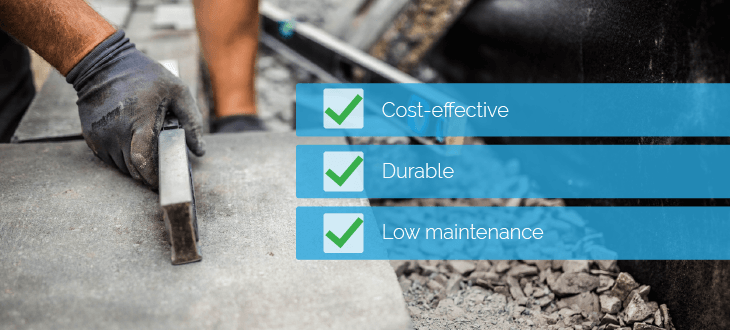
These driveway paving stones are known for their durability and versatility and are available in various shapes, sizes, and colours. Concrete pavers are considered relatively affordable and can mimic the look of natural stone or brick, making them an excellent choice for those on a budget.
Made from cement and aggregates such as sand and gravel, these driveways can withstand 8,000 to 10,000 pounds, making them one of the most durable pavers.
Concrete pavers have a great advantage - they are relatively low-maintenance. You can retain the fresh look of your driveway by simply sweeping it to remove debris and gently washing it with a mixture of non-acidic soap and water. With proper maintenance, concrete pavers can last up to 50 years!
However, there is a downside to concrete pavers. While low-maintenance, they are prone to staining due to their slightly porous nature. They can pick up oil stains much easier than other driveway paving stones. Similarly, direct sunlight over time can cause the colours to fade from your driveway.
These pavers are durable but not immune to cracking; cracks can occur due to freeze-thaw cycles in colder climates or soil movement beneath the driveway. However, the UK’s climate provides a suitable climate for concrete pavers so they are unlikely to crack.
Reapplying sealant to your driveway every two to three years is a great way to reduce the risk of fading and cracks. This protects your cost-effective, durable driveway from nasty UV rays and reduces the risk of cracking.
- Budget-friendly
- Durable
- Low-maintenance
- Prone to cracking
- Susceptible to stains
- Risk of fading due to strong sunlight
Brick Pavers
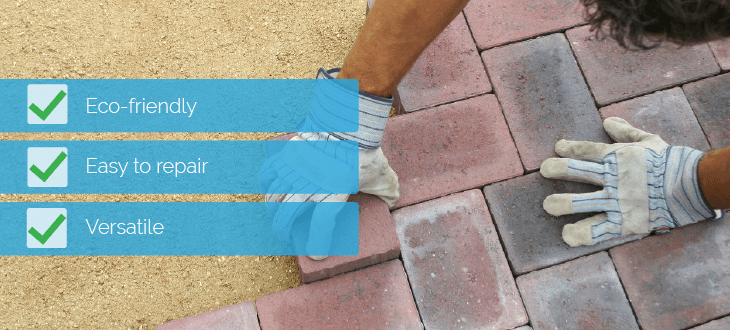
Brick pavers can give your home a timeless look. Made from natural clay, they are known for their durability, sustainability, and strength. They come in various colours, including traditional red and earth tones, allowing you to create a unique and eye-catching driveway.
Over time, brick pavers develop a weathered and rustic appearance that adds character to your driveway. They are also easy to maintain, as any damaged or stained pieces can be replaced individually. Although the installation can be challenging and costly, the advantage is that brick pavers are easy to maintain, and any damaged or stained pieces can be replaced individually. This can save future costs as you do not have to replace the entire driveway.
If appropriately maintained, driveway paving stones can last between 25 to 50 years. They require regular upkeep to prevent stains as they are somewhat porous and susceptible to weed growth. The joints between the brick pavers can allow weeds to grow if not properly maintained. Weeds may sprout through the gaps, requiring regular weeding or weed barriers to prevent them from taking root and detracting from the driveway's appearance. Using a weed barrier can prevent this issue from occurring.
Similar to concrete paving stones, driveway paving stones need to be reapplied with sealant to protect them from sun damage and stains.
- Eco-friendly
- Various colours available
- Easy to repair
- Difficult to install
- Weed growth
- Prone to sun damage
Natural Stone
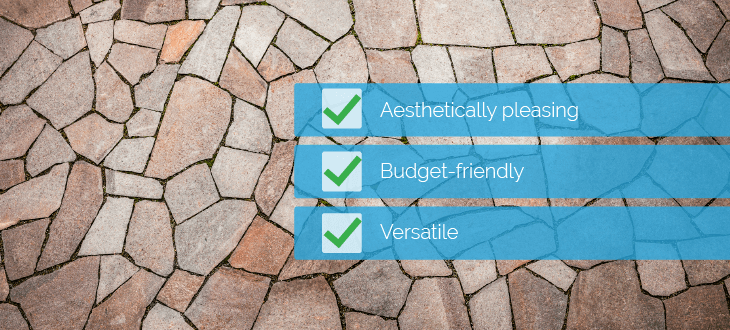
Natural stone pavers are an excellent choice for creating a stunning driveway. They are made from different types of natural stone, such as granite, limestone, or sandstone, each offering unique beauty and character.
One of the key advantages of natural stone pavers is their versatility in design. With a wide range of colours, shapes, and sizes available, you can create a driveway that perfectly complements the style of your home. Whether you prefer a modern, sleek look or a more rustic and traditional feel, a natural stone paver will suit your taste.
Certain types of natural stone, such as sandstone, are relatively soft, so choosing a thickness of 50mm or more is essential. Due to its softness, this natural stone can easily crack under the weight of vehicles and foot traffic.
Natural driveway paving stones require regular upkeep. Regular sweeping and occasional rinsing with water are usually sufficient to keep them clean. However, it's important to note that some types of natural stone, such as limestone, may require sealing to protect them from staining and weathering.
Furthermore, natural stone tends to become more slippery during wetter seasons than concrete or brick. We recommend a more textured natural stone paver to provide more grip.
Natural stone pavers offer a timeless and elegant option for your driveway. Their durability, versatility, and natural beauty make them a popular choice among homeowners who want to enhance the curb appeal of their property.
- Versatile
- Aesthetically pleasing
- Prone to cracking
- Slippery when wet
Interlocking Concrete Pavers
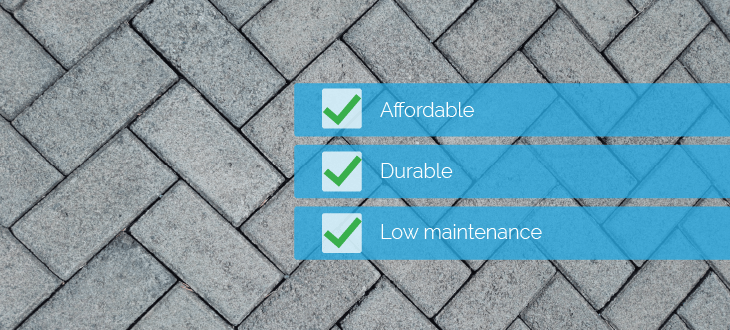
If you're looking for a more affordable yet equally durable option for your driveway, interlocking concrete pavers are worth considering. These pavers are made from moulded concrete and designed to fit together tightly, creating a stable, uniform, and visually appealing surface. Because they are so strong, these types of driveway paving stones can last up to 30 years as TileTech mentioned in “Introduction To Interlocking Pavers”.
One of the main advantages of interlocking concrete pavers is their ease of installation. The interlocking design allows for easy and precise placement, eliminating the need for mortar or adhesive. This makes the installation process quicker and more cost-effective than other paving options.
Despite their interlocking design, concrete pavers may shift or settle over time, mainly if the base preparation is inadequate or if the pavers are subjected to heavy loads or frequent freeze-thaw cycles. This can result in unevenness or trip hazards on the paved surface. It is essential to consider your area's climate before settling on this type of driveway paving stone.
Maintenance-wise, these driveway paving stones are relatively low-maintenance. Regular sweeping and occasional rinsing with water are usually sufficient to keep them clean. However, it's important to note that over time, the colour of the pavers may fade due to exposure to sunlight. Applying a sealant can help protect the colour and prolong the lifespan of your driveway.
Interlocking concrete pavers offer a cost-effective and versatile option for homeowners who want a durable and visually appealing driveway. With their ease of installation and wide range of design options, these pavers are a popular choice for many.
- Affordable
- Durable
- Low-maintenance
- Can shift over time
- Prone to fading
- Susceptible to cracking
Permeable Pavers
Permeable driveway stone paving is designed to allow water to infiltrate through the surface and into the ground below. Unlike traditional pavers such as brick or concrete, which create impermeable surfaces that can contribute to rainwater runoff and drainage issues, permeable pavers help to manage rainwater by allowing it to filter into the soil naturally.

In the UK, permeable pavers can be installed on a driveway larger than 5m² without a planning permit. We recommend opting for permeable pavers to avoid applying for planning permission.
By reducing rainwater runoff, permeable pavers help mitigate the negative impacts of urbanisation on the natural water cycle. They can also help filter out pollutants and contaminants from stormwater, improving water quality in nearby streams, rivers, and lakes. However, if you live in a climate that experiences intense freeze-thaw cycles, it is essential to note that the water that drains through the permeable paver can get trapped within the joints and freeze. This can cause the driveway paving stones to expand, which may result in cracking or even lifting.
Despite this potential downside, permeable pavers remain a valuable tool for managing rainwater, reducing runoff, preventing the need for planning permission and promoting sustainable land development practices.
- Great drainage
- Filters out pollutants
- Susceptible to freeze-thaw cycles
- Weed growth
Cost of driveway paving stones
The cost of driveway paving stones can vary depending on several factors, including the type of stone, the driveway's size, and the design's complexity.
The time spent installing the paving stones will affect the overall labour cost. Typically, driveway specialists charge between £150 to £200 per day, according to Price Your Job. Labour cost increases with the complexity of installation.
We have included a table below that shows the material cost per square metre, which you should consider and the average daily labour rate.
| Paver Type | Average cost per m2 |
|---|---|
| Concrete | £20 to £60 |
| Brick | £70 to £100 |
| Natural stone | £50 to £105 |
| Cobblestone | £70 to £130 |
The average cost for driveway paving stones for an area of 20m2 to 30m2 is around £3,500. However, your new driveway cost will increase if you choose a more complex design, higher-quality materials and have a larger driveway
The price of driveway paving stones may be higher than other options, but it's worth considering their long-term benefits. Paving stones are known for their durability and longevity. You won't have to worry about replacing or repairing your driveway as frequently as you would with other materials.
Whether you choose natural stone pavers, interlocking concrete pavers, or cobblestones, you can create a beautiful driveway that withstands time. When selecting suitable paving stones for your driveway, consider your budget, desired aesthetic, and maintenance requirements. With proper installation and regular maintenance, your driveway can become a stunning focal point, adding value and charm to your home for years.
It's important to note that these prices are estimates and can vary depending on location and the specific supplier or contractor you choose. It's always a good idea to get multiple quotes and compare prices before deciding.
At Household Quotes, we offer four free quotes tailored to your needs and preferences. You can save time and money by avoiding the hassle of searching for multiple quotes.
- Describe your needs
- Get free quotes
- Choose the best offer
It only takes 30 seconds

FAQ
The best type of paving stone driveway depends on your own requirements such as aesthetics and the level of maintenance you are willing to apply to them. However, it is always recommended to select a paving stone that is both durable and permeable which will allow your new driveway to withstand the weight of your car as well as allowing water to drain.
The best option for a driveway surface is concrete. Concrete slabs are durable, low-maintenance, easy to drive on, and suitable for any budget. Although they can be prone to cracking in extreme weather conditions, they are an ideal choice for UK climates.
The average cost to pave a driveway in the UK is approximately £3,500 for a small driveway ranging from 20m2 to 30m2. This cost may vary based on the choice of material, the design’s intricacy, and the driveway’s size.
Pavers should be at least 50 mm thick to withstand the weight of vehicles and prevent cracking.

Caoimhe is an experienced content writer and researcher who is passionate about providing accessible information to every reader. With a background in English literature and Sociology, she combines the two disciplines to create cohesive, well-thought-out, and well-informed pieces.
